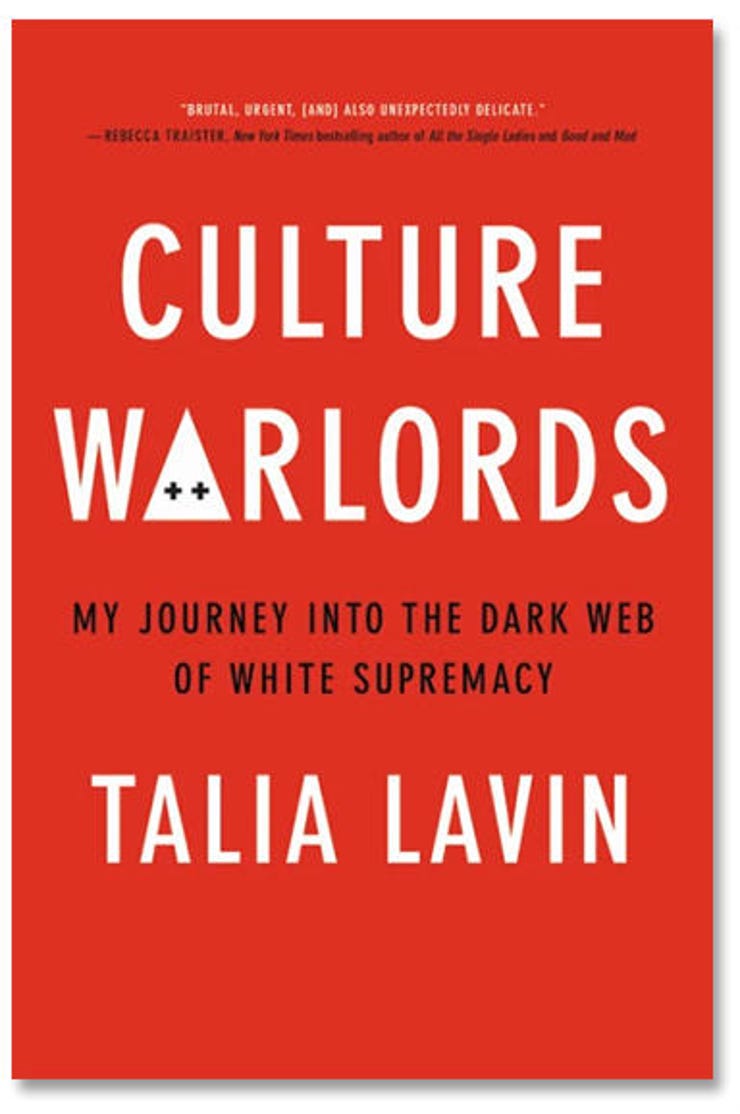Culture Warlords, book review: Into the heart of online darkness


Culture Warlords: My Journey Into the Dark Web of White Supremacy • by Talia Lavin • Hachette • 288 pages • ISBN: 978-0-30684643-4 • $27
I am deeply grateful that Talia Lavin chose to spend a year of her life reading the Net's most vitriolic, bigoted, racist, misogynist, and murderous chat sites and forums. First, because we really do need to know what's going on in these far corners of the internet, and second...well, because I don't want to have to. The result is Culture Warlords: My Journey Into the Dark Web of White Supremacy, a truly disturbing voyage into the heart of hate.
Lavin is perfectly formed for falling foul of the denizens in these forums. She describes what they see: "a fat, ugly, scheming feminist Jew (with a reputation for leftist journalism)". And, she says later, "antifa", which she sees as individuals collaborating to defend their cities against violent incomers who are rarely stopped by police.
These people would never knowingly let Lavin into their private conversations (which suggest she is "too ugly to rape"), so she adopts personas. For WhiteDate she refashions herself as a blonde, gun-toting Midwesterner, 'Ashlynn1488', who yearns for a strong white husband to give her cute, white babies. In 90 far-right Telegram channels she lurks as 'Tommy', who is given a pickup truck and a West Virginia home. She promises an administrator to "stomp some pagan heads" in order to join a private channel planning a Christgang vs Pagang fighting event, whose roots she traces to the literature of the medieval Crusades. Ultimately, the event was cancelled, in part because the intended beneficiary was arrested for kidnapping his wife at gunpoint and taking her across state lines against her will. This is a fun crowd!
Laundering extreme ideas
Which is why it's impressive that Lavin attends -- in person and under her own name -- the MindsIRL conference for right-wing YouTubers, whom she calls "launderers" that radicalise viewers by making extreme ideas palatable. Along with YouTube, she finds that the biggest promulgators of online hate are the usual suspects: Facebook and Twitter, plus the less-often discussed Telegram. However, she reminds us that these are just the latest venues; the Texas Ku Klux Klan had an online bulletin board as early as 1984, and any former Usenet user can tell stories. The book was completed before Parler became the right's new best friend.
"As I encountered all of this -- in person and online -- it left me with a feeling of despair, and anger, at the tech companies that had knowingly allowed this sort of hate to bloom, for profitability, for engagement," Lavin writes.
Google, Twitter and Facebook certainly do gain revenues and engagement; it's less clear what Telegram, which carries no ads, gets out of it. The ideas, however, cycle from traditional media to social media and back again, amplified along the way by mainstream politicians, cable news, radio, and YouTube stars.
Back in 1996, it was easy to believe that what was said on the internet stayed on the internet. By 2014, the inaugural conference hosted by the VOX-Pol research project was highlighting the way extremist ideas are laundered into the mainstream through online spaces that permit groups who would never share space in the physical world to swap tactics.
Lavin shows in detail how this works, building up steam until it erupts in real-world violence, to the surprise of the rest of us. This book should be required reading for everyone who talks about whether and how to regulate the internet.
RECENT AND RELATED CONTENT
Proud Boys websites kicked off web host, Google Cloud
In October 2020, Facebook decides to ban Holocaust denial
Facebook says AI enhancements have bolstered its content moderation efforts
Speech Police, book review: How to regain a democratic paradise lost
Defending democracy in a post-truth world filled with AI, VR and deepfakes
Read more book reviews
- The Smart Wife, book review: A feminist take on smart home tech
- Exponential Progress, book review: A patchy overview of today's emerging technologies
- The System, book review: How the internet works and who runs it
- How to Survive a Robot Invasion, book review: Humans are the problem
- Hashtag Activism, book review: A sign of the times